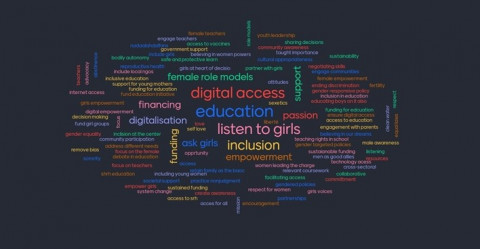
GCED Basic Search Form
Quick Search
You are here
News

Every year, the Commission on the Status of Women serves as an important forum for women’s empowerment, gathering dedicated champions for gender equality from all over the world. Its 65th session (CSW65) put the spotlight on the critical role girls and women play as leaders and decision-makers in all aspects of public life.
To highlight the leadership role of women and girls in education, UNESCO, the Group of Friends for Education and Lifelong Learning, the UN Girls’ Education Initiative (UNGEI) and Plan International held a virtual event on the sidelines of CSW65. The event brought together key stakeholders to discuss in depth how to build back equal through gender-transformative education systems.
Today, the world is facing an education crisis disproportionately impacting certain groups of populations more than others. Over 11 million girls and young women may not return to school following the pandemic, according to UNESCO estimates. This is in addition to the 128 million girls who were already out of school before the pandemic.
“Education remains one of key enablers for women and girls to realise their full potential and lead the change”, said Miroslav Klíma, Deputy Permanent Representative of the Czech Republic to the UN and Co-Chair of the Group of Friends for Education and Lifelong Learning. “We must take a stand to protect girls’ and women’s education today to give them an opportunity to be leaders and change-makers tomorrow.”
Girls and women leading the charge
To address the challenges faced by girls and women across the world during the COVID-19 pandemic, and especially those impeding on their learning, girls and women like Tania Rosas, Kadiatou Konate, Rangina Hamidi, Zoe Simpson, and Nada Al-Ahdal are acting for girls’ continued learning and return to school, access to health and nutrition, and leadership.
“Access to technology is one of the strongest elements for the democratization of education, and will be necessary for all girls to continue their education”, said Tania Rosas, founder of the El Origen Foundation supporting indigenous and refugee learners in Colombia. Recently launched by the Foundation, the O-lab application is a tool developed by girls for girls, providing both online and offline safe training opportunities.
Kadiatou Konate, founder of the Club of Young Girl Leaders in Guinea and an activist from a young age, has been promoting education through awareness-raising initiatives across Guinea. She is hoping for “a better world where gender and sex will not be fixed barriers and potential will rise above these considerations”.
“If I, as a girl, was not given the opportunity of education, I would not have become the Minister of Education today”, said Rangina Hamidi, Minister of Education of Afghanistan, stressing the key value of girls’ education and female role models in decision-making positions. “It is incredibly important to have role models in leading positions so that girls can look up to these women and believe that they too can potentially one day lead important institutions. Until and unless we create spaces for women to lead, it will be difficult to promote girls’ education because many don’t see the value and impact in educating a girl.”
Summarizing this first discussion, moderator Rita Bissoonauth from the African Union International Centre for Girls’ and Women’s Education highlighted the need for safe teaching and learning environments, role models, female teachers, proper infrastructure and peer support.
Transformative education for girls’ leadership
We must use this crisis as a moment to build back equal and establish a new normal for girls, and ensure that education does not perpetuate unequal power structures, but rather serves as a force to accelerate sustainable gender equality and full inclusion
What does ‘building back equal’ mean?
“Building back equal is taking this crisis as an opportunity to establish measures that promote resilience, to take deliberate efforts to remove gender bias and discrimination and promote equality in and through education, and to address the barriers and bottlenecks to girls’ education”, said Vibeke Jensen, Director for Peace and Sustainable Development at UNESCO, and currently leading UNESCO’s Global Education Coalition’s efforts to build back equal.
Calling to rethink and restructure education delivery, Zoe Simpson, Executive Director of the Women’s Centre of Jamaica Foundation and UNESCO Prize laureate spoke about the particular needs of young mothers. “Continuing education is a non-negotiable for all adolescent mothers”, she said. “The reality of adolescent mothers is that their attention will be divided between book and baby. Academic content must therefore be digitized for ease of access.”
Thubelihle, aged 19, is a young woman who completed secondary school in 2020 during the world’s largest education disruption in history. She shared her experience in moving from a classroom to learning from home and balancing her education with house chores. She also called for better delivery of girls’ rights to comprehensive sexual and reproductive health services, especially amid the pandemic.
Participants responded to a survey on three actions to take to build back equal.
Moderator for the second discussion, Geoff Adlide of the Global Partnership for Education also stressed the importance to hardwire gender equality within all education work and “lift education financing across the board” and. Financing was also a core theme of remarks made by Rose Campbell, Chief Executive Officer of Plan International UK, who said “we must come together urgently and increase funding for education to get girls back into school.”
“As a girl who has experienced the life-changing impacts of education, and who works for girls in my community, I am ready to be a partner with all the women to lead the charge”, said Nada Al-Ahdal, human rights activist and founder of the Nada Foundation. “Are you willing to pass the torch and take this partnership forward?”
More information:
URL:
https://en.unesco.org/news/girls-and-women-leading-charge-ensure-learningneverstops
